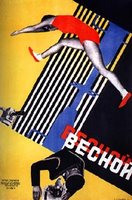
Sometimes, even in cinema history, when an artist is very popular and has a remarkable career their relatives are eclipsed by their prominence (nothing of this happens with this German aristocrat and his rich and fat heiresses…) even if they have some astounding film. This happens with Herr Mikhail Kaufman, brother of Boris Kaufman and Dziga Vertov.
Obviously the importance and influences of Herr Vertov on his brother Mikhail’s films is evident. But the last one didn’t limit himself to copying his relatives prior experimental and acclaimed films. On the contrary, Herr Kaufman contributed with important innovations (as the “dawn-to-dusk” format, a later standard technique of the so-called “City Symphonies” film genre). That’s not to mention that their oeuvre has elements of poetry and sensibility, intensified and inserted among vigorous film editing and… slight propaganda.
Those remarkable characteristics of Herr Mikhail Kaufman film can be seen in “Vesnoi” (Spring), a kind of film-essay shot in Ukraine during the spring of 1929.
“Vesnoi” pictures the struggle of people against the cold and harsh winter. And as this German Count said before, the film is full of those avant-garde and memorable film techniques that made the Russian film industry known for its own … revolutionary business.
In the film there is a beautiful and ingenious parallel to the arrival of spring. Herr Kaufman inserts images of nature, flower blossoms with happy children at ease playing, and at last… in the city streets are people in love and flirting around. (It is almost unbelievable but Russians falls in love too and fortunately with each others. He also parallels the merits of the success of the communist revolution, that is to say, fighting nature on behalf Bolshevist productivity, the awakening of proletarian masses against nature’s forces in the form the winter. A time in where the harshness, and the suffering of the people in such terrible weather is splendidly filmed with obscure and oppressing shots makes a fine comparison with the spring’s shining shots.
Besides the splendid film techniques (incredible camera angles, slow motion, syncopated editing) and the humanistic qualities of the film, there is also time for propaganda, natürlich! So we can see the powerful Bolshevist industry and energetic and merry workers that even had time for national sports as football, cycling, or the most important of all, crowded demonstrations.
Summing up, “Vesnoi” is a splendid film that deserves to be better known among the longhaired youngsters and likewise their director, Herr Mikhail Kaufman for his own merits and not merely as being “the brother of”.
And now, if you'll allow me, I must temporarily take my leave because this German Count must avoid their relatives in the next Teutonic soirée.
Herr Graf Ferdinand Von Galitzien
-/-
A veces, incluso durante el transcurso de la historia del cinematógrafo, cuando un artista es muy popular y tiene una importante carrera, sus familiares son eclipsados por su prominencia ( nada de eso sucede con las ricas y gordas herederas de éste aristócrata germánico… ) aunque ellos sean responsables de algún memorable filme; esta extraña situación sucedióle a Herr Mikhail Kaufman, hermano de Boris Kaufman y Dziga Vertov.
Obviamente, la importancia e influencias de Herr Vertov sobre los filmes de Mikhail son evidentes, pero afortunadamente éste último no se limitó a copiar los experimentales y aclamados filmes de su hermano, todo lo contrario, Herr Kaufman contribuyó a la historia del cinematógrafo con importantes innovaciones, como pueda ser el formato “de sol a sol”, una técnica posteriormente muy empleada en el género denominado “sinfonías urbanas”, además de que su obra posee importantes y destacados elementos líricos e intensa sensibilidad, insertados estos en vigorosos montajes además de sutil propaganda comunista.
Esas destacadas peculiaridades de la obra de Herr Mikhail Kaufman se pueden apreciar en “Vesnoi” ( Primavera ), una especie de ensayo cinematográfico rodado en Ucrania durante la primavera del año 1929; “Vesnoi” refleja la lucha de la gente con el frío y crudo invierno ucraniano y como éste Conde germánico mencionó recientemente, el filme está repleto de vanguardistas y memorables técnicas cinematográficas empleadas por la industria soviética para sus propios y gloriosos fines revolucionarios.
En el filme se puede apreciar un bello e ingenioso paralelismo ante la llegada de la primavera; Herr Kaufman intercala imágenes de una incipiente naturaleza, como puedan ser el florecer de diversas plantas o felices infantes jugando, por fin, en las calles además de cortejos y enamoramientos entre adultos ( aunque parezca mentira los rusos también se enamoraban, aunque afortunadamente, entre ellos… ) con planos de los logros de la revolución comunista, esto es, el esfuerzo y lucha en contra de las adversidades de la naturaleza ( el invierno, una época en donde la dureza y el sufrimiento de la gente durante tan difícil época del año, está espléndidamente filmada con oscuros y angustiosos planos, contraponiéndolos posteriormente con los brillantes y gozosos planos primaverales ) con la recompensa final y beneficio de la productividad bolchevique o el despertar de las masas proletarias.
Además de tan espléndidas técnicas cinematográficas ( increíbles planos, cámara lenta, sincopado montaje ) y las cualidades humanísticas del filme, también hay espacio para la propaganda, natürlich!, pudiéndose contemplar la poderosa industria bolchevique y sus enérgicos y alegres trabajadores que incluso tienen tiempo para practicar deportes nacionales tales como el fútbol, el ciclismo o el más importante de todos ellos: las manifestaciones públicas.
Resumiendo, “Vesnoi” es un espléndido filme que merece ser difundido entre los jóvenes melenudos y su director, Herr Mikhail Kaufman, ser reconocido por sus propios méritos y no simplemente por el hecho de ser “el hermano de”.
Y ahora si me lo permiten les tengo que dejar momentáneamente, pues este Conde germánico tiene que evitar a ciertos familiares en la próxima y teutónica soirée.
Herr Graf Ferdinand Von Galitzien

Keine Kommentare:
Kommentar veröffentlichen